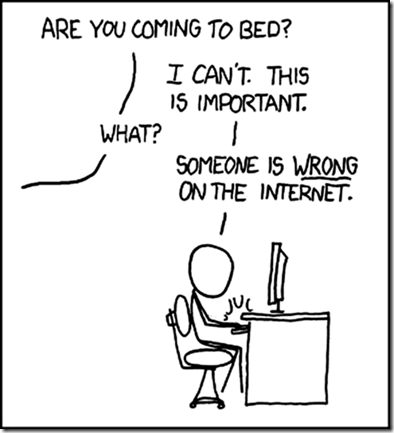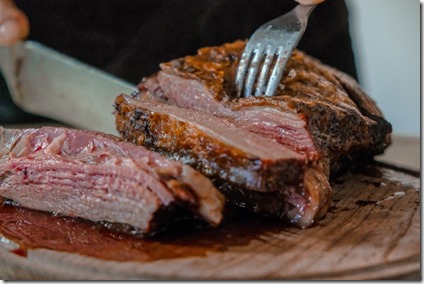 You’ve likely seen the picture above. It’s humorous because even though we all realize engaging in online debate typically does little to persuade others, we still do it. This is not new.
You’ve likely seen the picture above. It’s humorous because even though we all realize engaging in online debate typically does little to persuade others, we still do it. This is not new.
In the late 1700s a fellow minister informed John Newton that he was going to engage another minister in a theological disagreement. Newton’s response, now titled On Controversy, encourages this minister to check his own heart when engaging in controversy. Newton admits that “it seems a laudable service to defend the faith once delivered to the saints”. But he also recognizes a significant danger in this enterprise. As Newton says, “we find but very few writers of controversy who have not been manifestly hurt by it.”
I could make a similar observation as Newton. Early in my blogging “career” I would have been found in some of those discernment ministry circles. I listened to Derek Webb’s Wedding Dress this morning and it stirred up in me some of the same affection which I had when I heard it twenty years ago. This line in particular is stirring:
Cause money cannot buy
A husband’s jealous eye.,
When you have knowingly
Deceived his wife.
I have always been passionate about the church being people of integrity and walking in truth. And I’ve battled this call upon my own life as well. Newton has been a constant aid for me (this On Controversy letter in particular). I have watched as some of these warnings have consumed others—and I’ve seen the temptations bubble up within my own heart.
Newton’s Warning
Here is why Newton says “writers of controversy” are at a dangerous precipice:
- The temptation to grow in a sense of their own importance.
Controversy generates traffic. Flamethrowers and smoking dragons get attention on Twitter. But they often provide far more heat than light. When you engage in controversy and you get all this attention it can be a real temptation to think that you are more important than you actually are.
2. The temptation to imbibe an angry contentious spirit
Public anger seems to double rather than dissipate. The devil can easily put angry ideas within our mind, they can latch onto our disordered desires for anger, and then we can find a community ready to congratulate us. I have seen people who were once balanced, rational, gracious, and encouraging become absolutely overwhelmed by an angry spirit.
3. The temptation to insensibly withdraw attention from important matters to focus on secondary
There are things which will nurture our souls and will encourage the souls around us. These are often thrown to the side as we focus upon one particular area of truth or controversy. We can be consumed by our pet doctrines or our own causes.
This is why Newton called entering into controversy an honorable but dangerous task. He prayed that if this young man did enter into controversy that he would earnestly watch over his own soul. He further warned:
“it may become your own cause, and awaken in you those tempers which are inconsistent with true peace of mind, and will surely obstruct communion with God.”
I am taking this warning to heart. Fifteen years ago I was fighting for things like Calvinism and wanting to see pragmatism die within the church. The words of Newton tempered me. And I’m at a different place now. But I find that same impulse rising up within me when it comes to issues of justice and protecting the vulnerable. It’s a bit different battle, I think, but the temptations are the same. I need the words of Newton still today. Especially his call to “be upon your guard against admitting anything personal into the debate”.
Whatever side of any controversy you find yourself on these words of Newton are fitting and should be heeded:
If we act in a wrong spirit, we shall bring little glory to God, do little good to our fellow creatures, and procure neither honor nor comfort to ourselves. If you can be content with showing your wit, and gaining the laugh on your side, you have an easy task; but I hope you have a far nobler aim, and that, sensible of the solemn importance of gospel truths, and the compassion due to the souls of men, you would rather be a means of removing prejudices in a single instance, than obtain the empty applause of thousands. Go forth, therefore, in the name and strength of the Lord of hosts, speaking the truth in love; and may he give you a witness in many hearts that you are taught of God, and favored with the unction of his Holy Spirit.
May the glory of God be our aim at all times.



